We may not have the course you’re looking for. If you enquire or give us a call on +44 1344 203 999 and speak to our training experts, we may still be able to help with your training requirements.
We ensure quality, budget-alignment, and timely delivery by our expert instructors.

While handling complex projects, the most crucial part of Project Management is a Project Charter. But do you know What is a Project Charter? It is a formal document that defines the project’s purpose, objectives, scope, stakeholders, and overall plan. It is essentially the project's DNA, encapsulating the very essence of what the project aims to achieve.
Therefore, project teams must learn about this essential component. In this blog, you are going to learn about What is a Project Charter, its key components, importance. It will also help you with some tips to create for effective Project Management.
Table of Contents
1) What is a Project Charter?
2) Purpose of a Project Charter
3) Project Charter vs. Project Plan
4) Project Charter vs. Business Case
5) Key Components of a Project Charter
6) How to Create an Effective Project Charter?
7) Tips to Create a Project Charter
8) Project Charter Template Example
9) Does the Project Charter Include a Budget?
10) Who Creates the Project Charter?
11) Conclusion
What is a Project Charter?
A Project Charter is a concise document that certifies a project's existence and officially permeates Project Managers to work on it. Before the project is fully scoped out, a this Charter serves to establish a common understanding of the goals, objectives, and resource requirements.
Project Charters play a crucial role in Project Management since they serve as a roadmap for the project's fundamentals and serve as a resource for the duration of the project. In order to aid in the approval of the work, this formal document also demonstrates the project's viability and potential return on investment(ROI).
Moreover, the Project Charter aids Project Managers to communicate with stakeholders and participants about the goals and scope of the project. It also helps avoid getting involved in any potential dangers.
A Charter may have the same function as a Business Case, depending on the culture and Management Style of the organisation. A Charter can be several pages long in a large organisation, but it is mostly a few paragraphs long with bulleted elements.

Purpose of a Project Charter
There are several purposes of a Project Charter. Let’s discuss some of them in detail:
a) Establishing Vision and Scope: It clearly defines the project’s objectives, scope, and boundaries.This helps ensures that all stakeholders have a complete understanding of what the project aims to achieve.
b) Authorising the Project: It serves as a formal authorisation for the project to proceed. This, in turn, allows the Project Manager the authority to allocate different organisational resources.
c) Helps in Project Planning: Project Charter helps in detailed project planning. It provides essential information that helps in developing a successful Project Management plan.
d) Aligning Stakeholders: It helps in aligning the expectations of various stakeholders by documenting project goals, deliverables, timelines, roles and responsibilities. This reduces misunderstandings and conflicts.
e) Identifying Key Stakeholders: It helps in identifying all major stakeholders and defines their interests and involvement in the project. The Project Charter also facilitates effective communication and engagement strategies.
f) Outlining Resources and Budget: It provides an overview of the project’s budget, resources, and constraints, guiding the efficient allocation of resources throughout the project lifecycle.
g) Establishing Key Milestones and Timeline: The Charter outlines the major milestones and preliminary timeline, which helps in setting the project expectations.
h) Identifying Risks and Assumptions: It documents initial risks, assumptions, constraints, and dependencies, which helps Project Managers in early Risk Management and contingency planning.
Project Charter vs. Project Plan
Here is a comprehensive table that will help you understand the key differences between Project Charter vs. Project Plan:
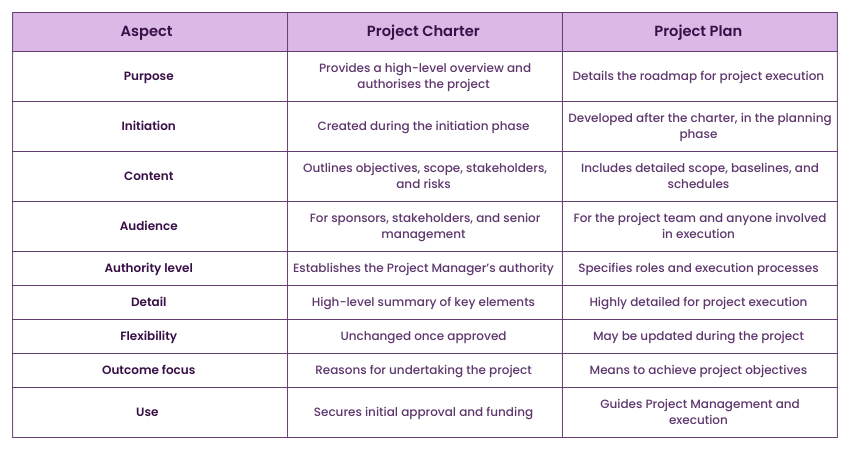
Project Charter vs Business Case
A Project Charter gives a broad summary of the project and what it aims to achieve. On the other hand, a Business Case highlights the project's worth by detailing its Return on Investment (ROI). It also sets up the organisation for potential future benefits.
The Business Case focuses on the business requirements or issues that the project is trying to solve, emphasising on concrete or abstract advantages such as higher earnings or competitive presence. It consists of a thorough ROI evaluation and outlines all assumptions and limitations.
While the Project Charter is a general document giving approval to the project, the Business Case supports the project by showing its worth and the resources needed. It enhances the project's feasibility by outlining the advantages and expenses.
Empower your Project Sponsor role with expert insights and tools for success today!
Key Components of a Project Charter
Now that you know What is a Project Charter, it is time to learn about its key components. The key components of the Project Charter serve as the building blocks, ensuring that the project is well-defined, purposeful, and aligned with organisational goals. Understanding these components is essential for crafting a comprehensive and effective Project Charter:
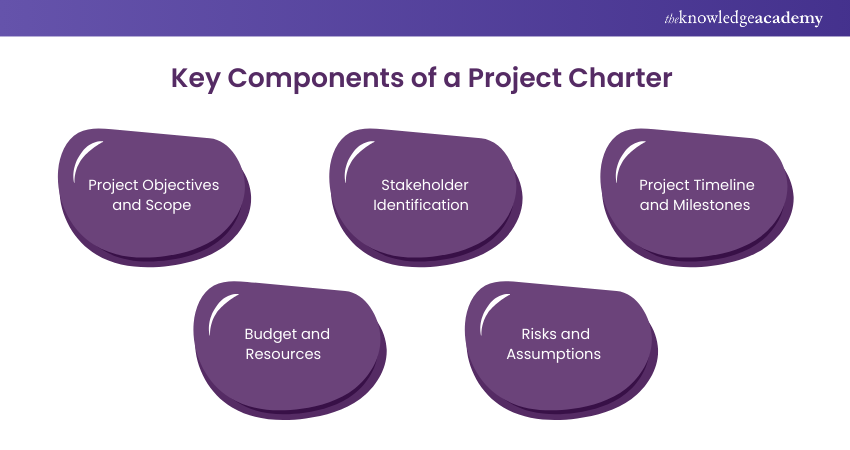
1) Project Objectives and Scope
Defining clear, specific, and measurable objectives is the cornerstone of a successful project. Objectives articulate what the project intends to accomplish. Alongside objectives, the scope provides a tangible target for the project team.
2) Stakeholder Identification
Identifying and understanding stakeholder is paramount in Project Management. Engaging stakeholders from the beginning fosters collaboration, garnering essential support and ensuring project success.
3) Project Timeline and Milestones
The Project Charter includes a well-structured timeline detailing project phases, deadlines, and milestones. Milestones specifically serve as markers of progress, allowing the project team to track accomplishments and stay on schedule.
4) Budget and Resources
The Charter outlines the project budget, including funding sources, allocations for different activities, and contingencies for unforeseen expenses. Altogether, these ensure that the project maintains optimal resource utilisation.
5) Risks and Assumptions
The Project Charter identifies potential risks, both internal and external, that could impact the project's progress. It also outlines assumptions, acknowledging underlying conditions or factors upon which the project is based.
Boost management skills with our Project Management for Non-Project Managers – Join today!
How to Create an Effective Project Charter?
There are a few steps involved in creating an effective Project Charter. These steps are as follows:
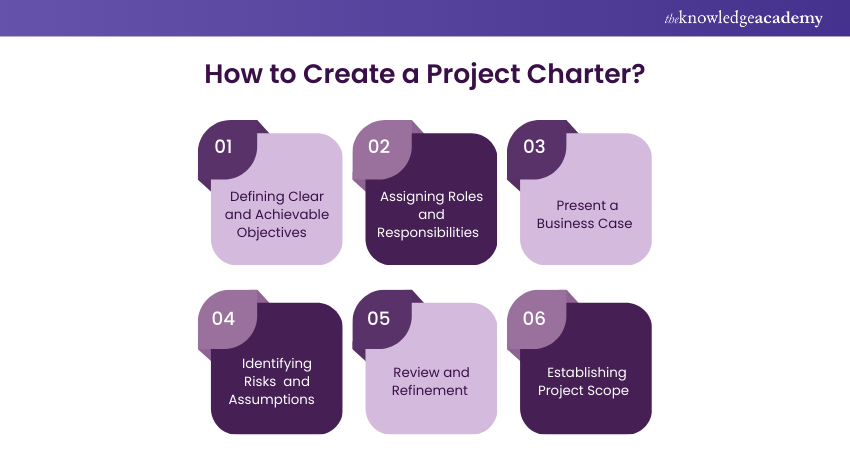
1) Defining Clear and Achievable Objectives
Determine the project's scope and the project's vision. This phase is essential to developing a Project Charter because it establishes goals and limitations within the project scope, setting the tone for the remainder of the project.
2) Assigning Roles and Responsibilities
Enumerate all the project's critical roles, such as those of the daily project team, customers, and stakeholders. To guarantee that the project team understands their tasks, the Project Charter should explicitly state what each team member is expected to do. It also guarantees and fosters excellent communication.
3) Present a Business Case
A project's Business Case outlines reasons for undertaking it. Thus, the Project Charter should include this to elucidate business requirements, like financial gains and stakeholder Return on Investment (ROI). Including a Business Case in your Charter is crucial for conveying project significance to sponsors and stakeholders.
4) Identifying Risks and Assumptions
Acknowledge project risks and assumptions in the Charter to proactively address challenges. Document potential risks and project conditions to develop mitigation strategies, ensuring smoother progress and preventing issues from escalating. This proactive approach enables the project team to develop mitigation strategies, addressing potential challenges before they escalate.
5) Review and Refinement
Review the initial Project Charter draft with stakeholders, gathering feedback for refinement. Collaboratively addressing concerns can ensure the final Charter reflects stakeholder consensus. In addition, it might foster a shared understanding and commitment to project goals.
6) Establishing Project Scope
You should consider and clearly establish the project's scope and objectives. This might let the project team and stakeholders better comprehend the project's aims and progress. But you must remember that a little change in the project’s scope can impact the work breakdown structure.
Elevate your expertise to new heights with our Project Management Training - join now!
Tips to Create a Project Charter
If you want to create a Project Charter, you must take note of some crucial tips. Let’s talk about those steps in detail:
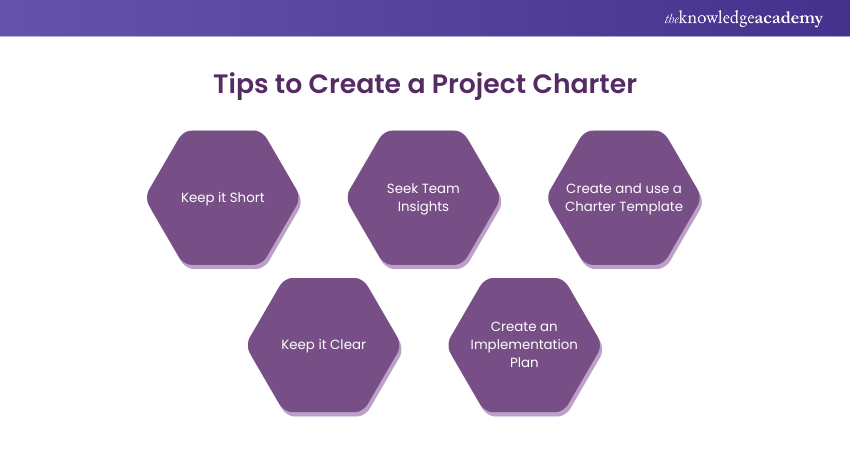
a) Keep it Short: Try to make it short and informative. The Charter must consist of only a few sentences for each component. A Project Charter ought to be a high-level synopsis rather than a detailed analysis.
b) Seek Team Insights: Ask for team insights since identifying potential project risks and setting reasonable goals are advantageous. You can facilitate communication with the Project team members through this tactic.
c) Create and use a Charter Template: With the help of a template, you can make proper Project Charters in the future. You can also ensure that they are more succinct and easier to understand.
d) Keep it Clear: Arrange the charter in a way that others find easily comprehensible. To keep it clear, you can give a name to every part of the charter.
e) Create an Implementation Plan: Make an execution plan. To do this, you should start thinking about how to apply the organised Charter. This entails speaking with stakeholders and project participants as well as obtaining funding and resources.
Project Charter Template Example
A Project Charter template will help Project Managers outline the elements needed to authorise the project. This template provides a framework that helps with decision-making and planning. Let’s discuss this template below:
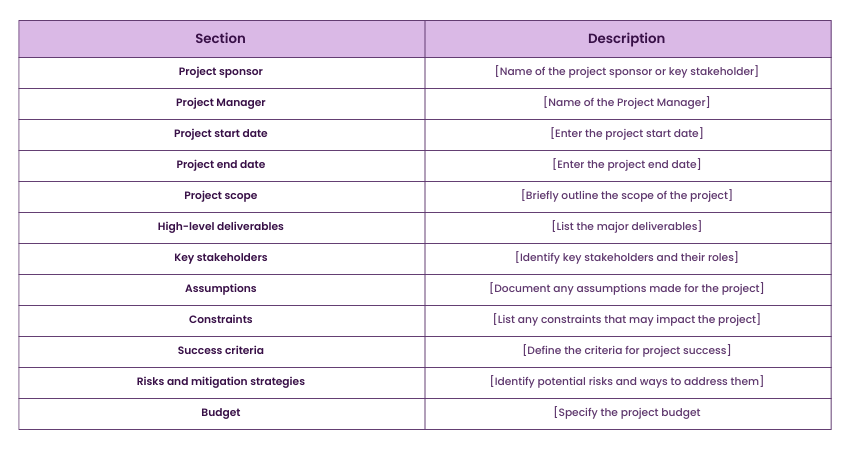
Essentially, this template can be enhanced and changed over time. It entirely depends on the complexity and the need of your project.
Does the Project Charter Include a Budget?
Yes, the Project Charter typically includes a high-level budget estimate. It outlines the financial resources required to complete the project, providing an overview rather than detailed figures. The exact breakdown is detailed later during project planning.
Who Creates the Project Charter?
The project sponsor usually creates the Project Charter, often with input from the project manager. The sponsor defines objectives, scope, and resources, while the project manager helps align the charter with organisational goals. It's a collaborative effort to initiate the project.
Conclusion
Creating an effective Project Charter demands meticulous planning, open communication, and collaboration. Through this blog, we hope you understood What is a Project Charter and how it serves as a unifying document that aligns Project stakeholders. It also clarifies objectives and establishes the groundwork for successful Project execution.
Master financing strategies with our Project and Infrastructure Financing Training – Register now!
Frequently Asked Questions
What is the Next Step After a Project Charter?

The next step is detailed project planning. This involves creating a project management plan, defining tasks, resources, timelines, budgets, and risk strategies. It transitions the project from initiation to execution by outlining how objectives in the charter will be achieved.
Does a Project Charter Include a Timeline?

Yes, a Project Charter includes a high-level timeline with key milestones and an estimated schedule. It provides a broad timeframe for project phases but doesn't detail specific tasks. A more comprehensive and detailed timeline is developed during the project planning stage.
What are the Other Resources and Offers Provided by The Knowledge Academy?

The Knowledge Academy takes global learning to new heights, offering over 3,000 online courses across 490+ locations in 190+ countries. This expansive reach ensures accessibility and convenience for learners worldwide.
Alongside our diverse Online Course Catalogue, encompassing 19 major categories, we go the extra mile by providing a plethora of free educational Online Resources like News updates, Blogs, videos, webinars, and interview questions. Tailoring learning experiences further, professionals can maximise value with customisable Course Bundles of TKA.
What is The Knowledge Pass, and How Does it Work?

The Knowledge Academy’s Knowledge Pass, a prepaid voucher, adds another layer of flexibility, allowing course bookings over a 12-month period. Join us on a journey where education knows no bounds.
What are the Related Courses and Blogs Provided by The Knowledge Academy?

The Knowledge Academy offers various Project Management Courses, including Certified Digital Services Project Manager Course, Certified Global Project Manager Training, and Project Management Office Fundamentals Certification Course. These courses cater to different skill levels, providing comprehensive insights into Project Management Methodologies.
Our Project Management Blogs cover a range of topics related to Project Charter, offering valuable resources, best practices, and industry insights. Whether you are a beginner or looking to advance your Project Management skills, The Knowledge Academy's diverse courses and informative blogs have you covered.
Upcoming Project Management Resources Batches & Dates
Date
 Introduction to Project Management Course
Introduction to Project Management Course
Fri 14th Mar 2025
Fri 9th May 2025
Fri 15th Aug 2025
Fri 10th Oct 2025
Fri 12th Dec 2025






 Top Rated Course
Top Rated Course


 If you wish to make any changes to your course, please
If you wish to make any changes to your course, please


